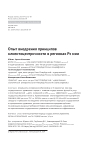The state Russian language in the political and legal mechanism for ensuring the security of the Russian Federation
DOI: 10.33917/mic-3.116.2024.90-98
The paper examines the role, place and importance of the state Russian language in the political and legal mechanism of ensuring the security of the Russian Federation. Russia is mainly focused on the problem of the implementation in practice of the policy of the Russian Federation in the field of the state Russian language and the need to take effective measures to neutralize the mechanism of destruction of the Russian language.
References:
1. Anishchenko V.N. On the modern theory and methodology of the study of the country’s security problems. Bulletin of the Academy of Economic Security of the Ministry of Internal Affairs of Russia. 2009;4:8-12. (In Russ.).
2. Ginzburg V. Emergency of emergency scale. RBC, 2008. The final issue.
3. Dvornikov V.A. Economic security – theory and reality of threats. M.: Publishing House of the Russian Academy of Social Sciences, 2000.
4. Doronin A.I. Business intelligence. 5th ed., reprint. and additional. M.: Axis-89, 2010. 704 p.
5. The draft law on the restriction of the use of foreign words in the public sphere. URL: https://tass.ru /
6. Decree of the President of the Russian Federation dated 07/02/2021 No. 400 «On the National Security Strategy of the Russian Federation». URL: http://www.pravo.gov.ru
7. Federal Law No. 52-FZ dated February 28, 2023 «On Amendments to the Federal Law “On the State Language of the Russian Federation”». URL: http://publication.pravo.gov.ru
8. Federal Law No. 53-FZ of June 1, 2005 «On the State Language of the Russian Federation» (Collection of Legislation of the Russian Federation, 2005, No. 23, Article 2199; 2013, No. 27, Article 3477; 2014, No. 19, Article 2306).
9. Hammer L. Large Nuclear Collider. RBC, 2008. The final issue.












